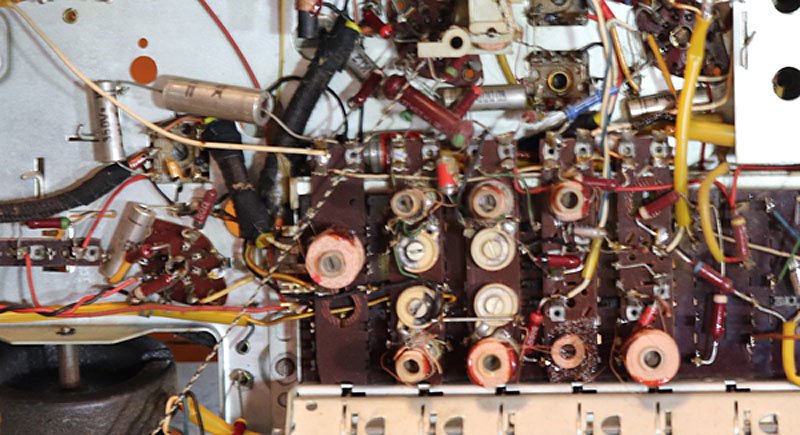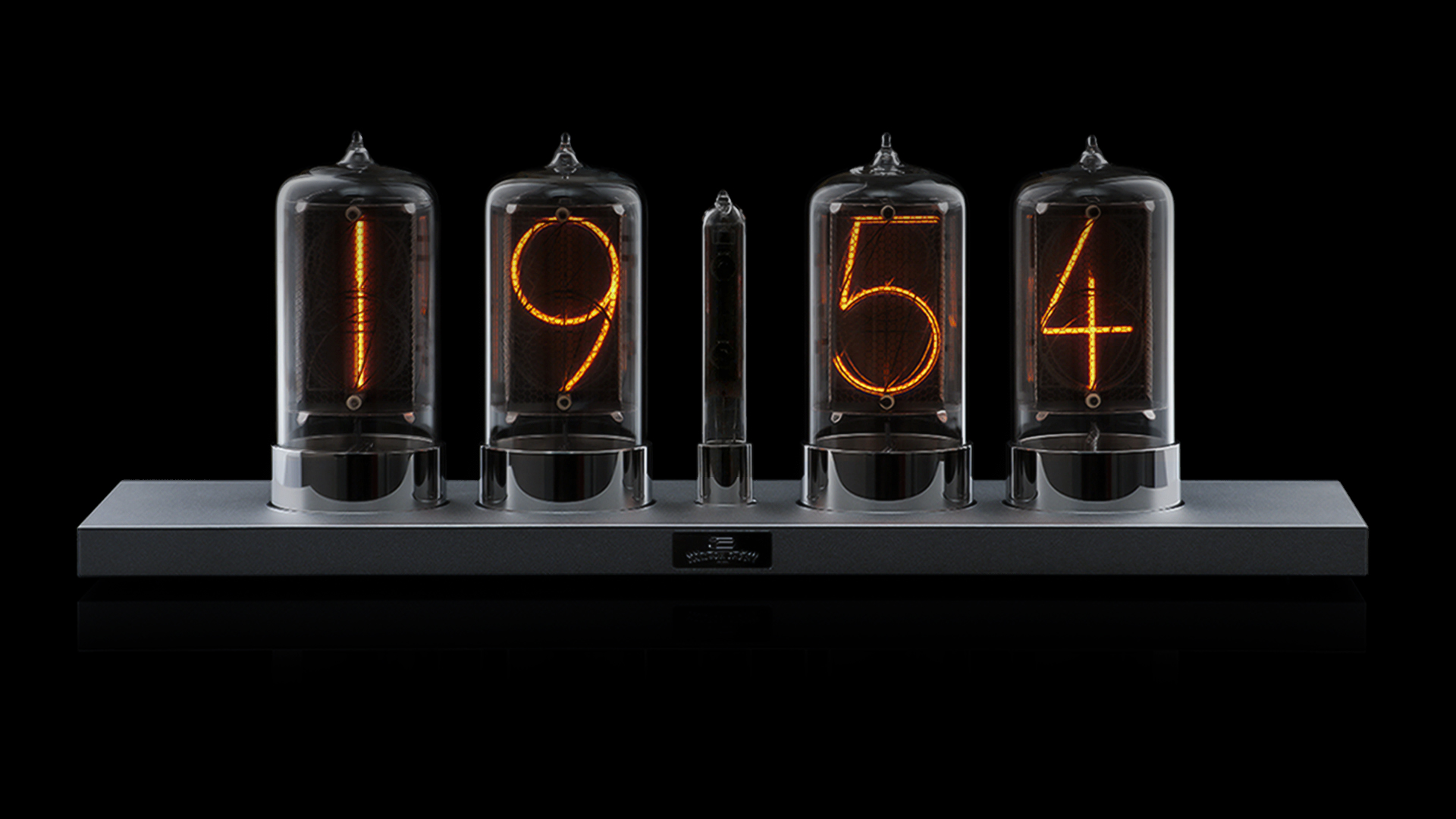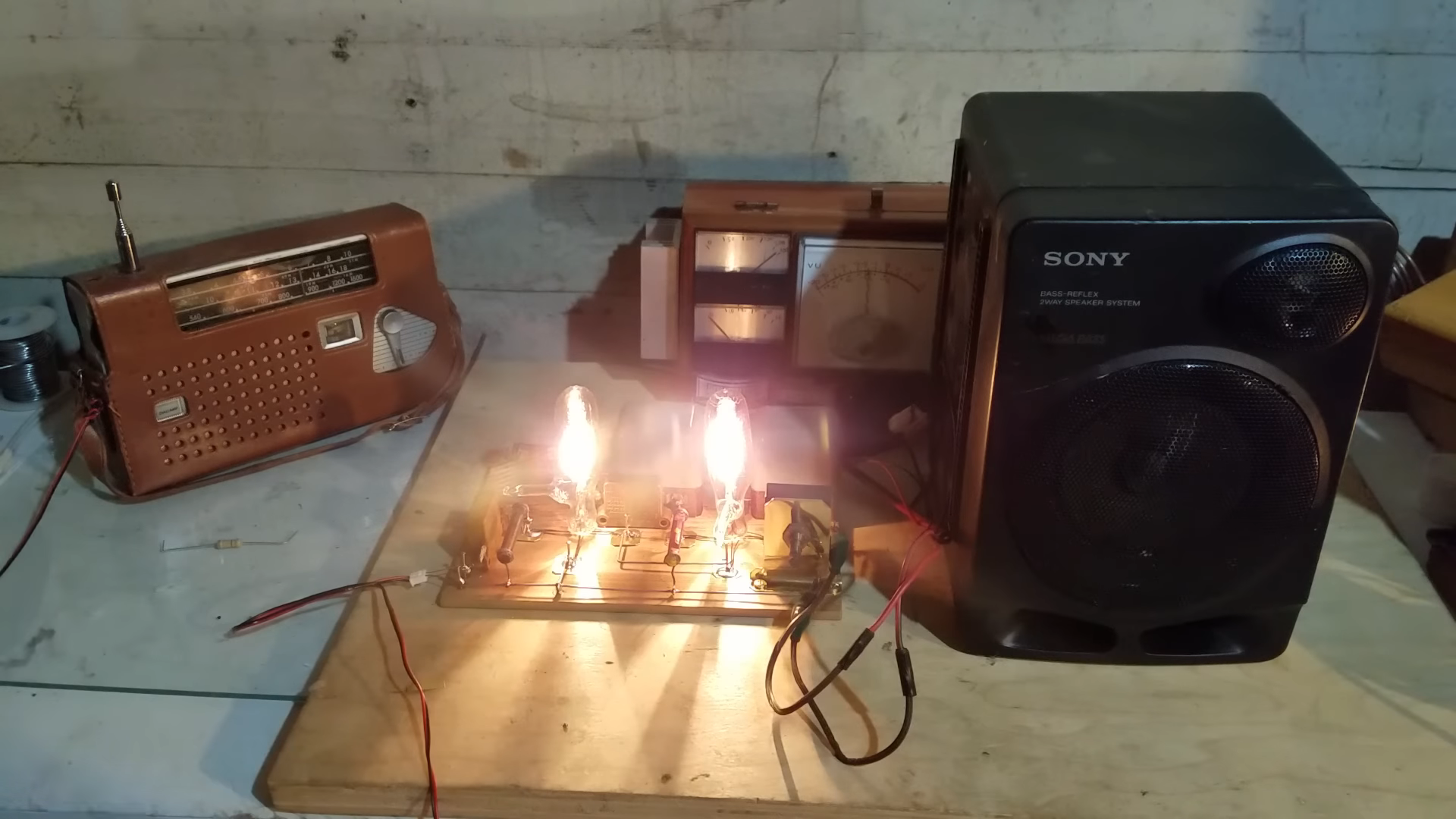 OK folks, it's tube time! I'm Dan, I'll be modding today along with Dusan as we welcome Keri Szafir to the Vintage Electronics Hack Chat!
OK folks, it's tube time! I'm Dan, I'll be modding today along with Dusan as we welcome Keri Szafir to the Vintage Electronics Hack Chat!
Hi Keri, are you online yet?
 Hi @Dan Maloney !
Hi @Dan Maloney !
 Technical difficulties, please stand by...
Technical difficulties, please stand by...
 Hi Bil!
Hi Bil!
 Just trying to get the chat rooms sorted out
Just trying to get the chat rooms sorted out

 Hi Boian!
Hi Boian!
 hello everyone :)
hello everyone :)
 first time on HC, I got the rooms wrong :)
first time on HC, I got the rooms wrong :)
 Hi!
Hi!
 Hey Keri, welcome aboard!
Hey Keri, welcome aboard!
 haha, nice seeing you :)
haha, nice seeing you :)
 Can you tell us a little about how you fell into the Dark Arts of old gear?
Can you tell us a little about how you fell into the Dark Arts of old gear?
 I was learning electronics in my teens in the '90s, and never having too much cash, I couldn't just go to a parts shop and buy new - I mostly salvaged them from old devices, so old stuff was no new to me even back then
I was learning electronics in my teens in the '90s, and never having too much cash, I couldn't just go to a parts shop and buy new - I mostly salvaged them from old devices, so old stuff was no new to me even back then
 Is there an audio visual aspect to this chat? Feel like I'm missing something...
Is there an audio visual aspect to this chat? Feel like I'm missing something...
 Nope, we just roll old school and do text chat.
Nope, we just roll old school and do text chat.

Keri Szafir's Profile
For getting out of my tiny lab to the broader world! Your regular mad scientist's plot to conquer the world. I've been building electronics for most of my life... Vacuum tube amps (guitar & hi-fi), vintage gear restorations, audio stuff, test gear, automation, fun projects etc. both for myself and for an occassional customer.
 Although we can post pix and links, ofc
Although we can post pix and links, ofc
 vintage, as in vacuum tubes? it was more like early 2000s (2003 or so) when I was at high school; I was fascinated by Fallout 1 & 2, with the '50s retro-futuristic aesthetics, all tube stuff (semiconductors were not invented in the alternate timeline the game's world took after WWII) and this got me into an interest in old Civil War era electronics, restoring and repairing devices, building my own inspired by the past
vintage, as in vacuum tubes? it was more like early 2000s (2003 or so) when I was at high school; I was fascinated by Fallout 1 & 2, with the '50s retro-futuristic aesthetics, all tube stuff (semiconductors were not invented in the alternate timeline the game's world took after WWII) and this got me into an interest in old Civil War era electronics, restoring and repairing devices, building my own inspired by the past
 Old TVs were always a great source of parts for me. Just don't forget to discharge the caps!
Old TVs were always a great source of parts for me. Just don't forget to discharge the caps!
 when I was learning electronics tubes were easy to get, ICs and transistors less so. Everyone was throwing out their B/W TV for Color TVs
when I was learning electronics tubes were easy to get, ICs and transistors less so. Everyone was throwing out their B/W TV for Color TVs
 I am older than transistors. In the 60's there were lots of vacuum tube devices and resources. By the 90's a lot of that was gone and inaccessible.
I am older than transistors. In the 60's there were lots of vacuum tube devices and resources. By the 90's a lot of that was gone and inaccessible.
 I got acquainted with a bunch of guitarists and did amp service and building for them too, that's how I got into almost living and breathing old tech
I got acquainted with a bunch of guitarists and did amp service and building for them too, that's how I got into almost living and breathing old tech
 I never did TVs, though I liked restoring radios
I never did TVs, though I liked restoring radios
![]() Keri, have you "evolved" toward early digital? I have questions on both :)
Keri, have you "evolved" toward early digital? I have questions on both :)
 Most of my builds were for Ham Radio, there were still WWII surplus parts available as well. 1625s made for great finals
Most of my builds were for Ham Radio, there were still WWII surplus parts available as well. 1625s made for great finals
 I can never resist a good Hamfest :-)
I can never resist a good Hamfest :-)
 I've been hitting thrift stores looking for restoration-worthy tube radios, but alas...
I've been hitting thrift stores looking for restoration-worthy tube radios, but alas...
![]() Cool, yeah I repair tube amps for many musicians. I've got some old Silvertone amps on my bench now.... there are parts in this thing I've never seen, like a big Condensor. What the hell is that?
Cool, yeah I repair tube amps for many musicians. I've got some old Silvertone amps on my bench now.... there are parts in this thing I've never seen, like a big Condensor. What the hell is that?
 What's the best way to discharge those old caps?
What's the best way to discharge those old caps?
 @DrG kinda, I sometimes worked with DTL
@DrG kinda, I sometimes worked with DTL
 Hamfests and swap meets tend to have vintage radios at better prices than other sources. Just be ready to negotiate and walk away
Hamfests and swap meets tend to have vintage radios at better prices than other sources. Just be ready to negotiate and walk away
![]() @Keri Szafir do you have any favorite boxes or websites for learning old school electronics like vacuum tubes, tube radios or maybe even nixie tubes?
@Keri Szafir do you have any favorite boxes or websites for learning old school electronics like vacuum tubes, tube radios or maybe even nixie tubes?
 @Dan Maloney Hamfests and swap meets tend to have vintage radios at better prices than other sources. Just be ready to negotiate and walk away
@Dan Maloney Hamfests and swap meets tend to have vintage radios at better prices than other sources. Just be ready to negotiate and walk away
 speaking of hamfests, I had an electronics fleamarket in my old city - that's where I got quite a lot of stuff, anything I could afford (and cash was always a problem), tubes, sockets, potentiometers, whatnot... and I wish I could grab more cheap Soviet tubes imported by Belarussian or Ukrainian guys who sold them here in Poland
speaking of hamfests, I had an electronics fleamarket in my old city - that's where I got quite a lot of stuff, anything I could afford (and cash was always a problem), tubes, sockets, potentiometers, whatnot... and I wish I could grab more cheap Soviet tubes imported by Belarussian or Ukrainian guys who sold them here in Poland
![]() ok - question - I am the proud (and accidental) owner of a Blaupunkt Barcelona (1957 I suppose) it works well and I have done only minimal repair and cleaning - do I have to change all those caps?
ok - question - I am the proud (and accidental) owner of a Blaupunkt Barcelona (1957 I suppose) it works well and I have done only minimal repair and cleaning - do I have to change all those caps?
 @Lt.Slothrop Jogis Roehrenbude would be my favorite tube-related website, and there's Frank's catalog I use for reference
@Lt.Slothrop Jogis Roehrenbude would be my favorite tube-related website, and there's Frank's catalog I use for reference
 other than that, Youtube of course, my #1 being Mr Carlson's Lab
other than that, Youtube of course, my #1 being Mr Carlson's Lab

https://www.vintage-radio.info/docs
Vintage Radio Documents and Articles
A selection of scanned technical and historic documents and magazine articles that should be of interest to vintage radio collectors etc. 31 files available. Click a row in the table below to download the file. You may download up to 10 different files in a 15 minute period.

http://www.tubebooks.org/Books/RDH4.pdf
 +100 for Mr. Carlson! I really like his new lab, too!
+100 for Mr. Carlson! I really like his new lab, too!
 DTL - Drift Tube Lineacs?
DTL - Drift Tube Lineacs?
Do you make your own tubes?

https://www.youtube.com/@RestoreOldRadios
RestoreOldRadios
Thanks for checking out my channel. I enjoy restoring old radios from the 30's through the 40's as a hobby when time permits. For those just getting started in vintage and/or antique radio repair/restorations, I hope you find the videos to be entertaining with a few tips inserted from time to time.
 as for caps - discharge them through a resistor (e.g. 10k 2W), change if there's visibly something wrong with them (bulges, deteriorated sealing etc.) or if tested and working wrong
as for caps - discharge them through a resistor (e.g. 10k 2W), change if there's visibly something wrong with them (bulges, deteriorated sealing etc.) or if tested and working wrong
![]() @Keri Szafir where do you buy your caps for tube amplifiers?
@Keri Szafir where do you buy your caps for tube amplifiers?
 and watch out for hot chassis on transformerless tube radios
and watch out for hot chassis on transformerless tube radios
 I mostly use vintage caps for my own builds, or buy new in some electronics parts stores
I mostly use vintage caps for my own builds, or buy new in some electronics parts stores
 oh yeah, hot chassis... I always use extra precautions for these
oh yeah, hot chassis... I always use extra precautions for these
 https://www.justradios.com/ has a lot parts and good infor on their website
https://www.justradios.com/ has a lot parts and good infor on their website
 Do you have a hard limit for replacing caps in terms of date? IOW, they may look fine, but teething was built in 1960 so just replace them?
Do you have a hard limit for replacing caps in terms of date? IOW, they may look fine, but teething was built in 1960 so just replace them?
 There must be a way to test caps, no?
There must be a way to test caps, no?
 ESR meter, right?
ESR meter, right?
![]() I think Dan is getting at why I asked...I get told that they all need to be replaced because they will blow and make a nasty mess.
I think Dan is getting at why I asked...I get told that they all need to be replaced because they will blow and make a nasty mess.
 I don't blanket replace caps, do it on a case-by-case basis, test for capacitance and ESR
I don't blanket replace caps, do it on a case-by-case basis, test for capacitance and ESR
 I'll also build a leakage tester - a useful tool
I'll also build a leakage tester - a useful tool
 I would think the less R&R you could do to an older piece of tech the better
I would think the less R&R you could do to an older piece of tech the better
 @Dan Maloney I replace electrolytics from 1970s and before. Any paper wax capacitor goes away as well. I have an old Heathkit cap tester but I found it tends to reform old electrolytic capacitors when testing. So I just replace the electrolytic capacitors so I don't have to go back later.
@Dan Maloney I replace electrolytics from 1970s and before. Any paper wax capacitor goes away as well. I have an old Heathkit cap tester but I found it tends to reform old electrolytic capacitors when testing. So I just replace the electrolytic capacitors so I don't have to go back later.
 oh yeah, especially very old stuff (pre-WWII, though I never had one on my bench); in that case I'll restuff the old can with modern components to preserve the visual originality AND not add anything modern on the bottom part of the chassis
oh yeah, especially very old stuff (pre-WWII, though I never had one on my bench); in that case I'll restuff the old can with modern components to preserve the visual originality AND not add anything modern on the bottom part of the chassis
 paper wax goes, no questions asked - these parts were utterly crappy and prone to failure
paper wax goes, no questions asked - these parts were utterly crappy and prone to failure
 Keri - that's an interesting idea
Keri - that's an interesting idea
 I had an old Hallicrafters that I recapped in the early '80s and had to replace the electrolytics again a few years ago
I had an old Hallicrafters that I recapped in the early '80s and had to replace the electrolytics again a few years ago
 who would have thought that we would outlive capacitors
who would have thought that we would outlive capacitors
 back then things were often built to last, though you're never sure - always check it!
back then things were often built to last, though you're never sure - always check it!
 The technology for capacitors has come a long way over the last few decades. That is why you can stuff old cans with new capacitors and have space left over
The technology for capacitors has come a long way over the last few decades. That is why you can stuff old cans with new capacitors and have space left over
 I like Keri's intro where she talks about smells, fixing things in the old days was deffinately a multi-sensory experience.
I like Keri's intro where she talks about smells, fixing things in the old days was deffinately a multi-sensory experience.
 oh yeah
oh yeah
 I am impressed with anyone that takes the time and effort to restuff old components. @Keri Szafir My restores are usually not that valuable or historically significant.
I am impressed with anyone that takes the time and effort to restuff old components. @Keri Szafir My restores are usually not that valuable or historically significant.
 I love when someone restuffs those big old can caps for a restoration. Such attention to detail!
I love when someone restuffs those big old can caps for a restoration. Such attention to detail!
 that's how I'd do it on something remarkable - other than that, I'd probably use a vintage cap from my stash
that's how I'd do it on something remarkable - other than that, I'd probably use a vintage cap from my stash
![]() I am personally VERY impressed with the careful point-to-point component soldering that I see in that radio....and of course, the schematic was included. It was built with quality.
I am personally VERY impressed with the careful point-to-point component soldering that I see in that radio....and of course, the schematic was included. It was built with quality.
The problem for me conceptually is when does a restoration mean no longer original - I guess always...but better to have it working.
 When restoring do folks usually test the tubes or only if the equipment doesn't work?
When restoring do folks usually test the tubes or only if the equipment doesn't work?
![]()

![]() blows me away going through it
blows me away going through it
 I agree that it's better to have it working at all. Maintaining the original aesthetics on the interior is a major bonus
I agree that it's better to have it working at all. Maintaining the original aesthetics on the interior is a major bonus
 I test tubes on amps, and when something's wrong, on radios too
I test tubes on amps, and when something's wrong, on radios too
 Just think about how labor-intensive it was to mass produce electronics before PCB construction. Blows the mind...
Just think about how labor-intensive it was to mass produce electronics before PCB construction. Blows the mind...
 oh yes - and it was mainly ladies who did it!
oh yes - and it was mainly ladies who did it!
 That is why TVs and Radios were expensive back in the day, a family only had one
That is why TVs and Radios were expensive back in the day, a family only had one
 And they did it fast, too. I think it was mostly piecework, so they got paid by the chassis
And they did it fast, too. I think it was mostly piecework, so they got paid by the chassis

 oh yes, ferrite core memory...
oh yes, ferrite core memory...
 Is this a chat about capacitors or vacuum tubes?
Is this a chat about capacitors or vacuum tubes?
Can you reproduce the Franck-Hertz experiment for class room use in high schools, colleges and universities world-wide? https://en.wikipedia.org/wiki/Franck%E2%80%93Hertz_experiment
 It's a chat about vintage electronics, so - yes!
It's a chat about vintage electronics, so - yes!
 Can you make your own vacuum tubes?
Can you make your own vacuum tubes?

wells gardner story.pdf
4 MB
 I can't - don't have the lab for that
I can't - don't have the lab for that
 What would you need?
What would you need?
 Wells Gardner story with radio assembly photos
Wells Gardner story with radio assembly photos
 Glass lathe, glass blowing equipment, vaccum pump
Glass lathe, glass blowing equipment, vaccum pump
 And the metal pieces doped with sometime dangerous materials
And the metal pieces doped with sometime dangerous materials
 Is there a university near you or research facility? I could write and recommend they help you. Or you can start a crowdfund.
Is there a university near you or research facility? I could write and recommend they help you. Or you can start a crowdfund.
 I'd need materials (barium oxide cathodes for indirectly heated, or tungsten for directly heated), metals for electrodes, glass, high vacuum pump setup, getters, burners for glassworking...
I'd need materials (barium oxide cathodes for indirectly heated, or tungsten for directly heated), metals for electrodes, glass, high vacuum pump setup, getters, burners for glassworking...
 lots of expensive materials
lots of expensive materials
 Others are building their own tubes, been posted in Hackaday
Others are building their own tubes, been posted in Hackaday
 This guy:
This guy:

https://hackaday.com/2022/10/27/a-homemade-tube-amplifier-featuring-homemade-tubes/
A Homemade Tube Amplifier Featuring Homemade Tubes
With the wealth of cheap and highly integrated audio amplifier modules on the market today, it takes a special dedication to roll your own from parts. Especially when those parts include vacuum tubes, and doubly so when you make the vacuum tubes from scratch too.
 ah, jdflyback :)
ah, jdflyback :)
 How much would it cost? Could you improve on vacuum tube technolgy using new methods of design? What from the past would help. Thanks Dan
How much would it cost? Could you improve on vacuum tube technolgy using new methods of design? What from the past would help. Thanks Dan

NIXIE TUBE & CLOCK MANUFACTURER
Nixie Tube & Clock Manufacturer
Today, we're running a small-scale production The distinct look and functionality of our Nixie tubes trail years of design, testing, and refinement. Each is produced in a laboratory setting, with hopes to one day employ large-scale production means to ensure access for everyone.
Read this on Nixie Tube & Clock Manufacturer
 In tube technology, I think the only thing that improved is the level of accuracy
In tube technology, I think the only thing that improved is the level of accuracy

 Dan Maloney
Dan Maloney

Discussions
Become a Hackaday.io Member
Create an account to leave a comment. Already have an account? Log In.